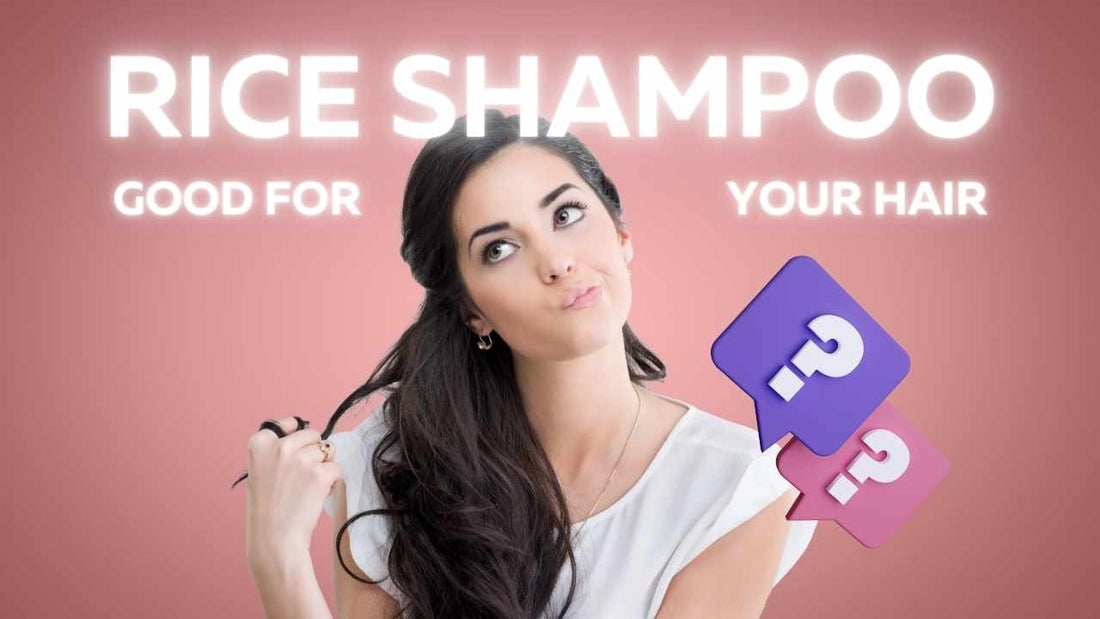
Is Rice Shampoo Good for Your Hair?
Share
Introduction
In recent times, there has been a noticeable shift towards embracing natural hair care products, and one that has been gaining popularity is rice shampoo. As people become more conscious of the potential harm caused by harsh chemicals in traditional hair care products, they are turning to nature's offerings for a safer and more nourishing alternative. Rice shampoo has emerged as a frontrunner in the realm of natural hair care due to its remarkable benefits. This article aims to explore the potential benefits of using rice shampoo for your hair and delve into the science behind its effectiveness.
Understanding Rice Shampoo
Rice Shampoo Defined: Hair Benefits Unveiled
Rice shampoo, as the name suggests, is a hair care product derived from rice. It might sound surprisingly simple, but the science behind its effectiveness is impressive. Rice, a staple food in many cultures, contains a wealth of nutrients that are not only beneficial for our bodies but also for our hair. The star of the show is inositol, a carbohydrate found in rice, which penetrates deep into the hair shaft, repairing and strengthening it from within.

The Science Behind Rice Shampoo's Effectiveness
Vital Nutrients Nourishing Your Hair Strands
Rice is a treasure trove of essential vitamins and minerals that work wonders for our hair health. The abundance of vitamin B, particularly Biotin, helps stimulate hair follicles, encouraging hair growth and adding volume to thinning hair. Vitamin E, known for its antioxidant properties, protects hair from damage caused by environmental stressors and free radicals, leaving it looking healthier and more vibrant. Amino acids present in rice contribute to repairing damaged hair, reducing breakage, and preventing split ends, making the hair strands more resilient.
Benefits of Rice Shampoo
Unlocking the Potential for Beautiful Hair
- Promotes Hair Growth and Thickness: The nutrients in it not only encourage hair growth but also improve the thickness and density of the hair. Regular use can lead to fuller and more voluminous locks.
- Enhances Hair Shine and Texture: Do you dream of glossy, lustrous hair? Rice shampoo can make that dream come true. The nourishing properties of rice enhance the hair's natural shine, giving it a healthy and radiant appearance. Additionally, the improved texture makes hair softer and more manageable.
- Restores Damaged Hair for Improved Health: For those struggling with damaged hair from excessive styling, heat, or chemical treatments, it can be a lifesaver. Its reparative properties help restore the health of damaged hair, resulting in smoother and more revitalized strands.
Rice Shampoo vs. Traditional Shampoo
Choosing Wisely for Your Hair's Well-being
One of the key differentiators between rice shampoo and traditional chemical-based shampoos lies in its ingredients and effects. While traditional shampoos often contain harsh chemicals, sulfates, and parabens, which can strip the hair of its natural oils and cause dryness and damage, rice shampoo stands out as a gentler, more natural alternative. By avoiding harmful chemicals, it promotes a healthier scalp and hair in the long run.
Rice Water for Hair
Unleashing the Potential of Rice Water
The benefits of rice shampoo can be attributed, in part, to its star ingredient - rice water. Rice water is a byproduct of the rinsing process during rice preparation. It has been used for centuries by women in some Asian countries to maintain their long, luxurious hair. Rice water is packed with vitamins and minerals that penetrate the hair cuticle, resulting in improved elasticity and overall hair health.
How to Use Rice Shampoo
Proper Application Techniques for Optimal Results
To reap the full benefits of rice shampoo, proper application is essential. Here is a step-by-step guide to effectively using it:
- Preparation: Start by wetting your hair thoroughly. It's recommended to use lukewarm water to open the hair cuticles and allow for better absorption of nutrients.
- Application: Take an appropriate amount of rice shampoo and apply it to your scalp. Gently massage the product in circular motions, ensuring it covers the entire scalp.
- Rinsing: After massaging for a few minutes, rinse your hair thoroughly with water. Make sure to remove all traces of the shampoo.
- Conditioning (Optional): Depending on your hair type and preference, you may choose to follow up with a rice-based conditioner or a natural hair conditioner to further nourish your hair.
- Drying: Gently pat your hair dry with a soft towel. Avoid using a rough towel to prevent hair breakage.
Suitable Hair Types for Rice Shampoo
Finding the Right Match for Your Hair
Rice shampoo is generally suitable for all hair types, but certain hair types can benefit more from its specific properties:
- Dry and Damaged Hair: If you have dry and damaged hair from excessive heat styling or chemical treatments, it can help restore moisture and repair the hair cuticles, leaving you with softer, healthier-looking hair.
- Thin and Fine Hair: Rice shampoo's ability to promote hair growth and thickness can be especially beneficial for those with thin and fine hair, giving their locks a fuller and more voluminous appearance.
- Oily Hair: Surprisingly, it can also be effective for people with oily hair. It helps regulate the production of sebum on the scalp, leading to less oily hair between washes.
- Color-Treated Hair: Worried about fading hair color? Fear not! It is generally safe for color-treated hair, provided you choose a sulfate-free and gentle formula.
Addressing Common Concerns
Ensuring Safe Usage for All Hair Types
While rice shampoo is generally safe and beneficial for most hair types, a few common concerns need to be addressed:
- Potential Scalp Irritation: Some individuals may experience mild scalp irritation when using rice shampoo, especially if they have a sensitive scalp. It is advisable to perform a patch test before incorporating it into your regular hair care routine.
- Color-Treated Hair: While rice shampoo is safe for color-treated hair, it is essential to choose a product free from harsh chemicals and sulfates to preserve your hair color's vibrancy.
Hair Maintenance with Rice Shampoo
Incorporating Rice Shampoo into Your Daily Routine
To maximize the benefits of rice shampoo, it is essential to integrate it into your daily hair care routine. Consistency is key, so consider the following tips:
- Regular Use: Incorporate rice shampoo into your weekly hair care routine. Aim for at least two to three washes per week to see noticeable results.
- Follow with Conditioner: While rice shampoo nourishes and cleanses your hair, a lightweight conditioner can further improve the overall texture and manageability of your locks.
- Avoid Excessive Heat Styling: Minimize the use of heat styling tools as they can cause damage to your hair. Embrace natural hair-drying methods whenever possible.
- Trim Regularly: Regular trims help maintain healthy ends and prevent split ends from traveling up the hair shaft.
Rice Shampoo for Different Hair Issues
Targeting Specific Hair Problems with Rice Shampoo
Rice shampoo's versatility extends beyond general hair care. Let's explore how it can address specific hair issues:
- For Oily Hair and Its Effectiveness: If you struggle with greasy hair, using rice shampoo can help balance oil production, leaving your hair feeling fresher for longer periods.
- Reviving Dry and Damaged Hair: For those battling dry and damaged hair, the nourishing properties of rice shampoo can help restore and revitalize your hair, promoting healthier and smoother locks.
DIY Rice Shampoo Recipes
Personalizing Your Shampoo Experience
Embrace your inner alchemist and create your own DIY rice shampoo formulations tailored to your hair needs. Here are a few simple recipes to get you started:
- Basic Rice Shampoo: Combine rice water with a few drops of your favorite essential oil for a natural and refreshing cleansing experience.
- Rice and Aloe Vera Shampoo: Mix rice water with aloe vera gel for added hydration and soothing properties, perfect for those with dry or irritated scalps.
- Rice and Honey Shampoo: Blend rice water with honey for a nourishing and sweet-smelling shampoo that promotes hair shine and softness.
Recommended Rice Shampoo Brands
Exploring Quality Products in the Market
With the rising popularity of rice shampoo, numerous brands have emerged with their unique formulations. Here are a few reputable rice shampoo brands to consider:
- RiceTress Natural Rice Water Shampoo Bar : Known for its natural and organic ingredients, this brand offers a range of rice shampoos suitable for various hair types.
- Herbal Elegance Rice Water Shampoo: A favorite among enthusiasts, this brand incorporates rice water with herbal extracts for a luxurious and beneficial hair-cleansing experience.
Transitioning to Rice Shampoo
Tips for a Smooth Switch
Transitioning from traditional to rice shampoo may require a bit of adjustment. Here are some tips to make the switch more comfortable:
- Gradual Transition: Start by incorporating rice shampoo into your routine once a week and gradually increase the frequency as your hair adjusts to the new formula.
- Clarifying Wash: Before starting with rice shampoo, do a clarifying wash with a gentle shampoo to remove any product buildup or residue from your hair.
- Hydration is Key: Follow up with a moisturizing conditioner to keep your hair hydrated during the transition phase.
- Patience and Persistence: It may take a few weeks for your hair to adapt fully, so be patient and persistent with the new hair care routine.
Environmental Impact of Rice Shampoo
Embracing Sustainability
Apart from its numerous hair benefits, rice shampoo also presents environmental advantages:
- Biodegradable Formula: Many rice shampoos have biodegradable formulas, making them environmentally friendly and reducing the impact on aquatic life.
- Sustainable Packaging: Look for brands that use eco-friendly and sustainable packaging, such as recyclable bottles or refill options.
The Science Behind Rice Shampoo
Research Studies and Expert Opinions
While anecdotal evidence of rice shampoo's effectiveness is abundant, there have also been research studies conducted to back up these claims. Experts in the field of hair care have provided insights into the potential benefits of rice shampoo.
FAQs
Addressing frequently asked questions about rice shampoo, including concerns about potential hair fall and its suitability for different hair types, can help readers feel more confident about trying this natural hair care solution.
What is rice shampoo good for?
It is a natural hair care product that is made from water that is left over after rice has been cooked. It is said to have a number of benefits for hair, including:
- Strengthening and conditioning hair: Rice water is rich in amino acids, which are essential for hair health. These amino acids help to strengthen the hair shaft and make it more resistant to breakage.
- Promoting hair growth: Rice water contains a compound called inositol, which has been shown to stimulate hair growth.
- Adding shine and luster: Rice water can help to add shine and luster to hair.
- Controlling frizz: Rice water can help to control frizz and make hair more manageable.
- Protecting hair from damage: Rice water can help to protect hair from damage caused by heat styling, sun exposure, and other environmental factors.
How often to use rice water shampoo?
The frequency with which you use rice water shampoo will depend on your hair type and needs. Some people find that using it once a week is enough, while others may need to use it more often. If you have dry or damaged hair, you may want to use it more often. If you have oily hair, you may want to use it less often.
Can you put rice water on dirty hair?
Yes, you can put rice water on dirty hair. In fact, some people believe that it is more effective on dirty hair because dirt and oil help to absorb the nutrients in the rice water. However, if your hair is very dirty, you may want to wash it with shampoo first.
What are the disadvantages of washing hair with rice water?
There are a few potential disadvantages to washing hair with rice water. First, it can be time-consuming to make the rice water and apply it to your hair. Second, it may not be as effective as commercial shampoos for people with very oily hair. Third, some people may experience an allergic reaction to rice water.
Should I use rice water before or after I wash my hair?
You can use it before or after you wash your hair. If you use it before, you will need to wash your hair with shampoo afterward. If you use it after, you can either rinse your hair with water or leave it in.
Can I wash my hair with rice water every day?
It is not recommended to wash your hair with it every day. This is because the nutrients in the rice water can build up on your hair and make it appear greasy. If you have dry or damaged hair, you may be able to get away with washing it with rice water every other day. However, if you have oily hair, you should only use it once a week.
Can I wash my hair without shampoo after applying rice water?
Yes, you can wash your hair without shampoo after applying rice water. In fact, some people believe that this is the best way to use it This is because the shampoo can wash away some of the nutrients in the rice water.
Do you use shampoo and conditioner after rice water?
You can use shampoo and conditioner after rice water, but it is not necessary. If you have oily hair, you may want to use a mild shampoo to remove any excess oil. If you have dry or damaged hair, you may want to use a conditioner to help moisturize your hair.

















